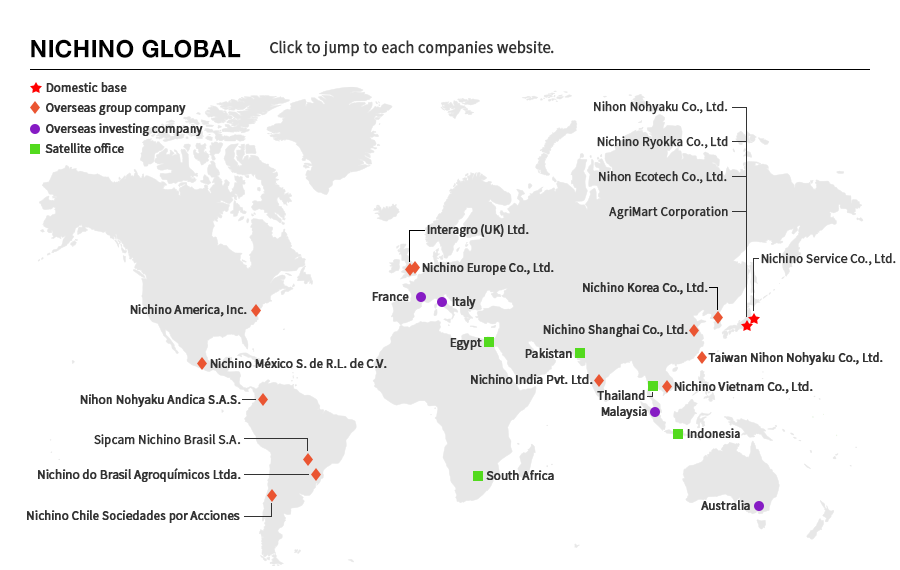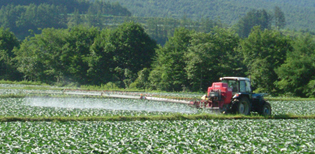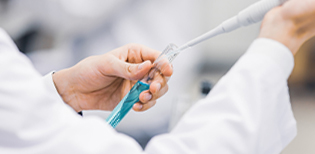Commitment of Top Management
We contribute to the realization of a sustainable society by ensuring a safe and steady food supply and protecting quality of life.
Promoting sustainability management
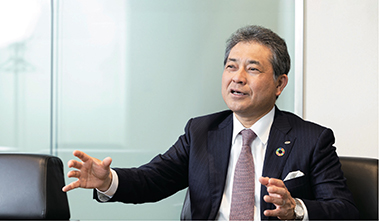
NICHINO Group was established in 1928 as the first agrochemical manufacturer in Japan. Since then, the Group has developed over time with a business model of research and development, manufacturing, sales, and promotion of agrochemicals to protect crops from pest infestations and weeds. Japan’s domestic economic environment and demographics have undergone major changes, such as a period of high economic growth after the war and the three lost decades following the collapse of the bubble economy. In this environment, Nihon Nohyaku has contributed to the steady supply of food not only in Japan but also around the world by ensuring crop yields and improving crop quality.
The “unique technology” that we have cultivated as an R&D-driven company and the “entrepreneurship” that has led to a variety of innovations are strengths that Nihon Nohyaku has possessed since its founding. Over the past 20 years, Nihon Nohyaku has also strengthened its global expansion based on the unique policy of “globalization & localization,” and has sought to promote local development through initiatives that are rooted in various regions. By developing business in this way with a focus on our strengths, we have established a unique position for ourselves in the agrochemical industry.
For NICHINO Group to continue its business activities going forward, it will need to leverage these distinctive strengths while responding appropriately to the demands of the new era. This is because the social conditions surrounding us are changing rapidly and in complex ways.
Just looking back over the past few years, the world has changed dramatically. It has been one year since COVID-19—which broke out at the end of 2019—subsided and was reclassified as a Category V Infectious Disease. Although daily life in Japan is gradually returning to normal, our lifestyles, workstyles, and business environments have changed significantly in comparison to pre-COVID-19 times. Geopolitical risks are also increasing, with the prolonged Russian invasion of Ukraine and the worsening situation in the Middle East. Accordingly, future forecasts remain unclear.
In addition, given the nature of our business, we cannot overlook global climate change issues, such as the El Niño phenomenon. Unprecedented weather events, including droughts and heavy rains, are having various effects on agricultural production.
In corporate management, there is now a demand for proactive initiatives and information disclosure regarding non-financial value, including ESG management and human capital management. There is also a strong demand for companies to transform themselves into entities that can compete responsibly in the government-led global market. Contributing to the realization of a sustainable society has become a natural responsibility for companies.
In light of these changes, I strongly believe that we need to work even harder to resolve diverse and global social issues. To that end, we will promote sustainability management that further develops CSR management, which is based on both economic value and social value.
As a first step towards doing this, we decided to review NICHINO Group’s raison d’être and revise parts of our Basic Principles and Action Charter. Three Basic Principles are: “We contribute to the realization of a sustainable society by ensuring a safe and steady food supply and protecting quality of life,” “We respond to the needs of society by taking on the challenge of creating new value,” and “We respond to the expectations of all stakeholders through fair and vigorous corporate activities.” While still respecting our past principles, this update reflects our determination to achieve sustainable growth for NICHINO Group while also striving for long-term environmental, social, and economic sustainability. We also revised part of our Action Charter in line with this update, and we will ensure that it is shared with all Group companies
Continuing initiatives for the Seven Priority Issues
To concretely implement sustainability management, we selected Seven Priority Issues (materiality) based on their importance to NICHINO Group’s business, and worked to address them. Progress for FY2023 was as follows.
E: Raising the level of environmental management (environmental conservation)
In addition to reducing daily energy consumption, we began solar power generation at the Nichino Service Fukushima Plant. We are working to improve the modal shift rate, such as by responding to the 2024 logistics problem that deals with concerns over a decline in truck transport capacity. We are also switching to formulations that have a lower environmental impact, including by reducing the use of organic solvents.
Moreover, we responded to the CDP (Carbon Disclosure Project)’s assessment for the first time and received a “B” rating in the area of climate change. We will continue to strive for further improvements.
S: Expansion of human rights management (DE&I, human capital development)
We formulated a new Human Rights Policy by expanding on our previous Basic Human Rights Policy. We also conducted a procurement survey for our first-tier suppliers using the United Nations Global Compact assessment tool. Although no major issues have been identified at this time, we will continue to provide feedback based on survey results and make improvements while promoting human rights due diligence.
In addition, we are implementing global personnel exchanges as part of our efforts to promote the active participation of diverse human resources. As of the end of March 2024, the ratio of female managers had increased to 10.3%.
S: Enhancing the safety culture (occupational safety & health, product safety)
We believe that safety is of utmost importance in the Group’s business activities. During this fiscal year, Nichino India began operating a dedicated facility for the production of benzpyrimoxan technical product. We will continue to strengthen our governance functions with the aim of achieving zero accidents across the entire Group globally.
S: Development of technologies and products that meet the needs of society (pursuing customer satisfaction)
We plan to increase our ratio of eco-harmonized products that have a lower environmental impact. By setting our own strict internal standards, we will pursue higher performance and safety, thereby accelerating global registrations. As part of this, we have begun domestic sales of Cross Value, a biostimulant.
In response to smart agriculture, we are obtaining additional registrations for existing products so that they can be sprayed by drones. We are also working to expand our smartphone app, “LeiMe AI Disease, Pest & Weed Analysis,” overseas. Going forward, we will aim to develop promising compounds, including pharmaceuticals and animal health products. We will also target license-in and sales of new biopesticides and crop aid products.
S: Community involvement (dialogue with stakeholders)
As part of our brand strategy, we consolidated the Group’s logo and expanded it globally. The Research Center is participating in Osaka Prefecture’s Adopt-a-Forest Program and working on reforestation activities. In addition, we have been included as a constituent in the FTSE Blossom Japan Sector Relative Index, which reflects the performance of Japanese companies with excellent ESG (Environmental, Social and Governance) practices. Going forward, we will work to raise awareness regarding the necessity and safety of agrochemicals.
G: Strengthening corporate and organizational governance (corporate governance)
We revised the general control checklist and expanded the scope of our overseas Group companies. We will continuously strive to expand global RC activities, strengthen and expand internal audits, and work to establish sustainability management within the Group.
ESG-wide: Expansion of compliance and risk management (BCP)
In order to strengthen compliance with the Foreign Exchange and Foreign Trade Act regarding the import and export of agrochemicals, we established and began operating a Trade Control Committee. In addition, we collected information on regulatory trends in various countries, including on organofluorine compounds. We also selected SDG items to which NICHINO Group’s business contributes. We will continue to organize BCP issues, such as responses to large-scale disasters.
Aiming for the ideal business model
The medium-term management plan “Ensuring Growing Global 2 (EGG2),” which we worked on for the three years up to FY2023, was affected by factors such as the spread of COVID-19. However, under the three basic policies of “improvement of profitability,” “technological innovation and establishment of next-generation businesses,” and “sustainable growth in corporate value,” we successfully achieved our targets of net sales of 100.0 billion yen and an operating profit margin of 7%.
Our new medium-term management plan, “Growing Global for Sustainability (GGS),” has begun in FY2024. We have positioned these next three years as a time to further develop our sustainability management, which aims for sustainable growth over the medium- to long-term. GGS has six basic policies. “Expansion of business and earnings,” “creation of new earnings sources,” and “strengthening the financial base” aim to improve economic value, while “raising the level of environmental management,” “promotion of human rights management,” and “strengthening corporate and organizational governance” aim to improve social value.
As part of these efforts, we will deepen our business strategy by developing eco-harmonized products and expanding our business portfolio beyond agrochemicals. In doing so, we aim to reduce greenhouse gas (GHG) emissions to achieve carbon neutrality, as well as raise the level of environmental management. We will also accelerate the promotion of human capital management to maximize the potential of human resources, who are the source of NICHINO Group’s strength.
Our vision for the future is to realize a vision “Global Innovator for Crop & Life.” Specifically, we aim to be a unique company with a business scale of 300.0 billion yen or more, which would place us within the top 10 in the global agrochemical market. We also aim to achieve carbon neutrality in the global life sciences market and be a company that continuously creates eco-harmonized products, services, and technologies. Through all this, we strive to make significant contributions to the realization of a sustainable society.
As milestones for this, we aim to create financial value by 2030 with a business scale of over 150.0 billion yen, an operating profit margin of 10% or more, and an ROE of 10% or more. We also set targets for creating non-financial value, such as environmental conservation and human capital development.
Since its founding, Nihon Nohyaku has contributed to stable food production by providing agrochemical products to eliminate pest infestations and weeds. These business activities themselves are directly linked to the sustainability of society and stand as our raison d’être, a fact we are proud of. As long as our business continues, this will remain unchanged. We will provide advanced technologies that meet social needs in a wide range of fields, including agrochemicals, pharmaceuticals, and animal health products. In addition, we will strive to ensure a steady food supply, take on challenges to protect rich lifestyles and the environment, and contribute to the realization of a sustainable society.
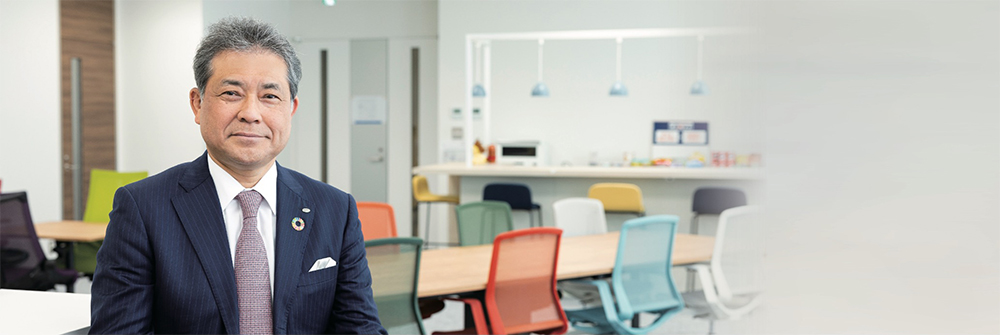
Hiroyuki Iwata President and Representative Director


